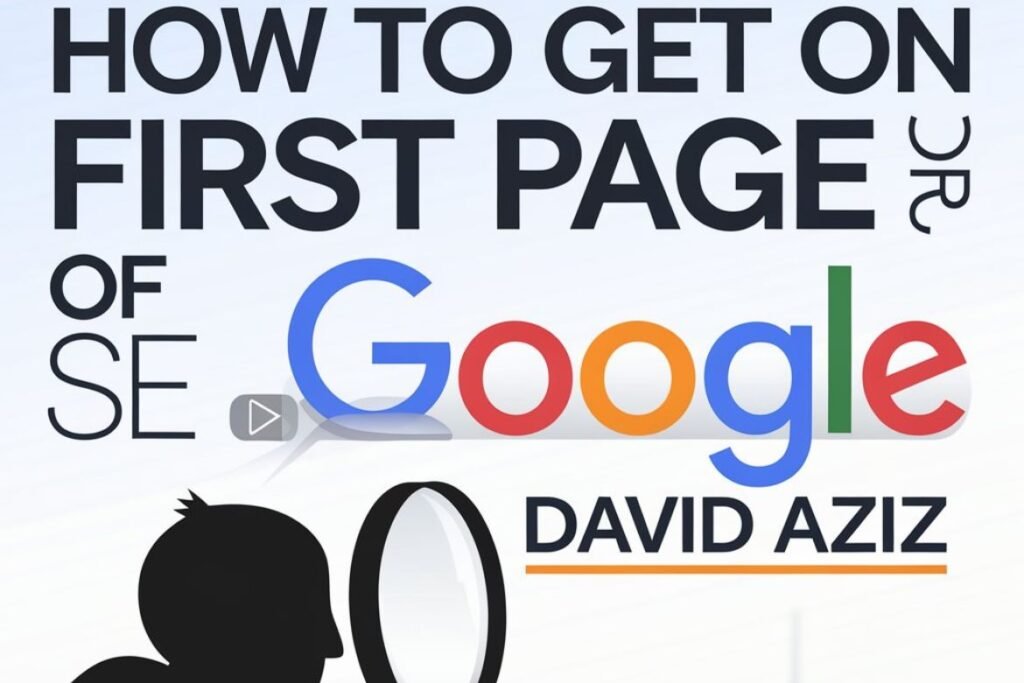How to get on First Page of Google Search David Aziz In today’s digital era, securing a spot on the first page of Google search results is crucial for businesses and individuals alike. With millions of websites vying for attention, understanding and leveraging effective search engine optimization (SEO) strategies has become more critical than ever. One name that stands out in the realm of SEO is David Aziz, a recognized expert known for his innovative approaches to achieving top rankings. This article explores David Aziz’s insights and actionable strategies to help you climb to the coveted first page of Google search results.
Understanding Google’s Ranking System
The Role of Search Engine Algorithms
Google’s ranking system relies on complex algorithms designed to deliver the most relevant and useful results to users. These algorithms analyze factors like content quality, keyword relevance, and website authority to determine a page’s ranking. Updates like Google’s Core Algorithm and BERT emphasize the importance of user-focused content. Mastering these elements is essential for achieving high rankings.
Key Factors Affecting Rankings
Three primary factors influence Google rankings:
- Relevance: Ensuring your content aligns with user intent and search queries.
- Authority: Establishing your website as a credible source through backlinks and domain strength.
- User Experience: Optimizing page load speed, mobile responsiveness, and overall usability.
Keyword Research: The Foundation of SEO
Why Keywords Matter
How to get on First Page of Google Search David Aziz Keywords are the backbone of SEO, serving as the bridge between what users search for and the content you provide. Identifying the right keywords ensures that your website appears in relevant searches, driving organic traffic and boosting visibility.
Tools for Effective Keyword Research
Utilizing tools like Google Keyword Planner, Ahrefs, and SEMrush can streamline your keyword research process. These tools help uncover high-volume, low-competition keywords, giving you a competitive edge.
Identifying High-Volume, Low-Competition Keywords
Focus on finding keywords that strike a balance between popularity and competition. For example, targeting long-tail keywords such as “best SEO strategies for small businesses” can attract a niche audience while reducing competition.
Crafting High-Quality Content
The Importance of Original, Valuable Content
Quality content is king when it comes to SEO. Google prioritizes pages that provide unique and actionable information. Avoid duplicate content and focus on creating material that solves problems or answers questions for your audience.
David Aziz’s Tips for Writing Engaging Articles
Aziz emphasizes the need to:
- Address user intent directly.
- Structure content into short, digestible sections.
- Use visuals like images, infographics, and videos to enhance readability.
Optimizing Content with Keywords
How to get on First Page of Google Search David Aziz Incorporate your target keywords naturally into titles, headers, and body text. Avoid keyword stuffing, which can harm your rankings. Instead, aim for a seamless integration that enhances the content’s flow.
On-Page SEO Strategies
Meta Tags and Descriptions
Meta tags and descriptions act as a preview for your content. Craft compelling meta descriptions that include your target keywords to increase click-through rates.
Header Tags and Their Importance
Proper use of header tags (H1, H2, H3) helps Google understand your content’s structure. Use them to break down your article into logical sections, making it more accessible for readers and search engines.
Internal Linking for Better Navigation
Internal links improve website navigation and help search engines crawl your site more effectively. Link to related articles or pages to keep users engaged and distribute link equity.
Mobile Optimization
Why Mobile-Friendly Sites Rank Higher
With the majority of web traffic originating from mobile devices, Google prioritizes mobile-friendly websites. A responsive design ensures your site adapts to different screen sizes, improving user experience.
Tools to Test Mobile Responsiveness
How to get on First Page of Google Search David Aziz Tools like Google’s Mobile-Friendly Test and BrowserStack can help evaluate your site’s mobile performance. Use these insights to make necessary adjustments.
Tips for Improving Mobile Usability
- Use a responsive design framework.
- Optimize images and reduce file sizes.
- Simplify navigation menus for smaller screens.
Page Speed and Its Impact on Rankings
Understanding Google’s PageSpeed Insights Tool
Google’s PageSpeed Insights tool evaluates your website’s loading speed and provides actionable recommendations. Faster loading pages lead to better user experiences and higher rankings.
Tips for Enhancing Page Load Speed
- Compress images to reduce their file size.
- Minimize HTTP requests by consolidating CSS and JavaScript files.
- Leverage browser caching to improve repeat visitor performance.
Building Domain Authority
What is Domain Authority?
Domain authority measures the credibility of your website. A higher domain authority signals to Google that your site is a trustworthy source of information.
David Aziz’s Approach to Link Building
Aziz highlights the importance of earning backlinks from authoritative websites. Strategies include guest posting, creating shareable content, and collaborating with influencers in your niche.
Leveraging Local SEO
Importance of Google My Business Listings
How to get on First Page of Google Search David Aziz For local businesses, Google My Business (GMB) is a powerful tool. Optimizing your GMB profile with accurate information, photos, and reviews can drive local traffic.
Optimizing for Local Keywords
Use location-specific keywords like “best coffee shop in Manhattan” to attract local audiences. Combine this with localized content to improve relevance.
Collecting and Showcasing Customer Reviews
Encourage satisfied customers to leave positive reviews on platforms like Google and Yelp. Highlighting these reviews can enhance your online reputation.
Technical SEO Essentials
What is Technical SEO?
How to get on First Page of Google Search David Aziz Technical SEO focuses on optimizing your site’s backend to improve its performance and visibility. Elements include site speed, crawlability, and structured data.
Fixing Crawl Errors
Crawl errors occur when search engines cannot access your pages. Use tools like Google Search Console to identify and resolve these issues.
Setting Up an XML Sitemap
An XML sitemap helps search engines index your pages efficiently. Regularly update your sitemap to reflect changes in your site’s structure.
Leveraging Social Media for SEO
How Social Signals Influence Rankings
How to get on First Page of Google Search David Aziz While not a direct ranking factor, social signals like shares and likes can boost your content’s visibility. High engagement on social media often translates to increased website traffic.
David Aziz’s Social Media Strategy
Aziz recommends:
- Sharing high-quality content regularly.
- Engaging with your audience through comments and messages.
- Collaborating with influencers to amplify reach.
Conclusion
How to get on First Page of Google Search David Aziz Achieving first-page rankings on Google requires a multifaceted approach that combines technical expertise, high-quality content, and strategic planning. By implementing the actionable strategies outlined above and drawing inspiration from David Aziz’s proven methodologies, you can improve your website’s visibility and drive organic traffic. Consistency, adaptability, and a commitment to delivering value will be your keys to success.
FAQs
- Who is David Aziz, and why is he considered an SEO expert? David Aziz is a renowned SEO strategist known for helping businesses achieve first-page rankings on Google through innovative techniques and data-driven approaches.
- What are the most important factors for ranking on Google’s first page? Key factors include content relevance, domain authority, user experience, and technical SEO.
- How long does it take to see results from SEO efforts? SEO is a long-term strategy, typically taking 3-6 months to show significant results, depending on the competition and industry.
- What tools are recommended for keyword research? Popular tools include Google Keyword Planner, Ahrefs, SEMrush, and Ubersuggest.
- Can small businesses compete for first-page rankings? Yes, by targeting local keywords, optimizing for niche audiences, and delivering high-quality content.
- What is the role of backlinks in SEO success? Backlinks from credible websites enhance your site’s authority, improving its chances of ranking higher on Google.
Read More: Sturnballs









